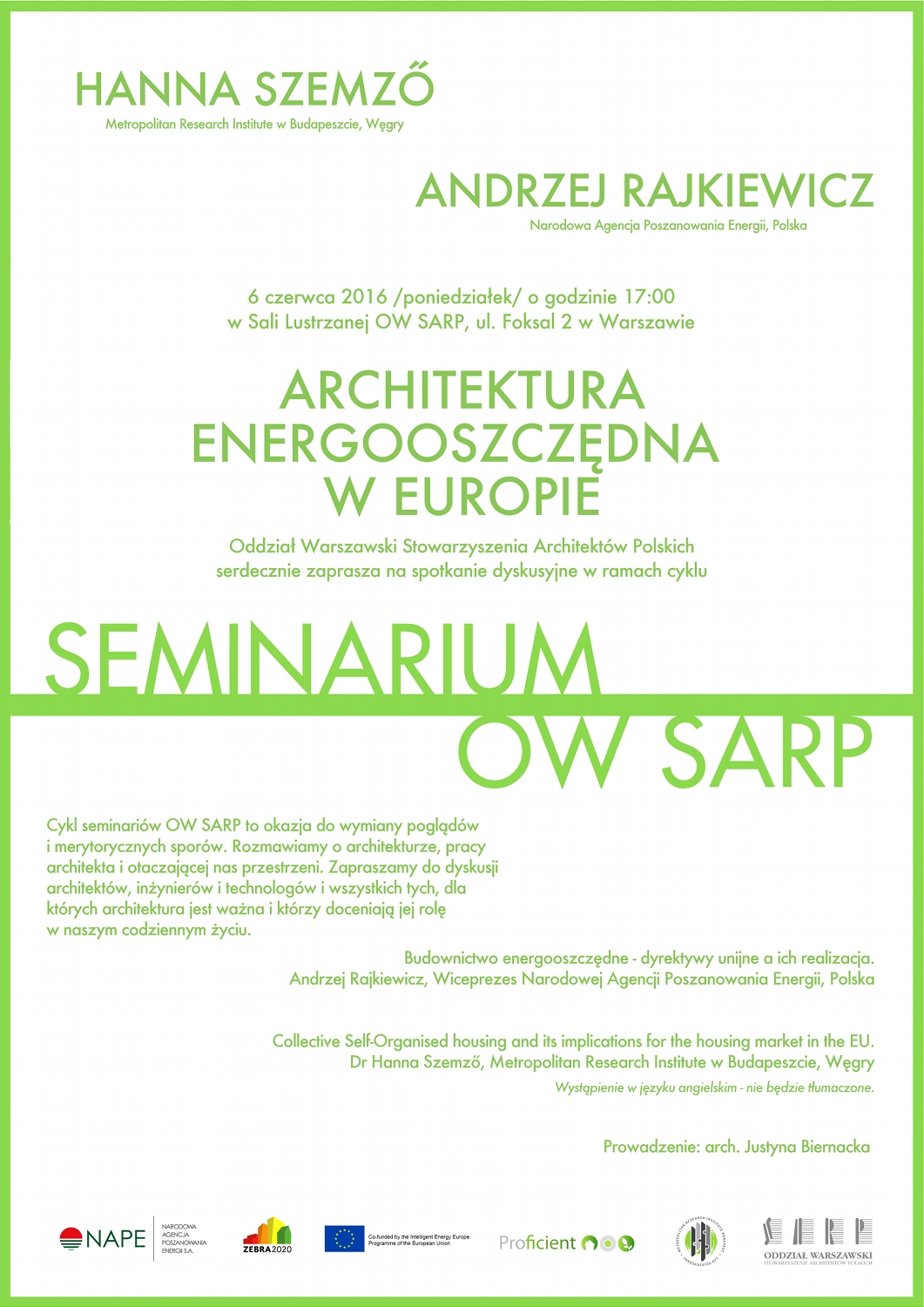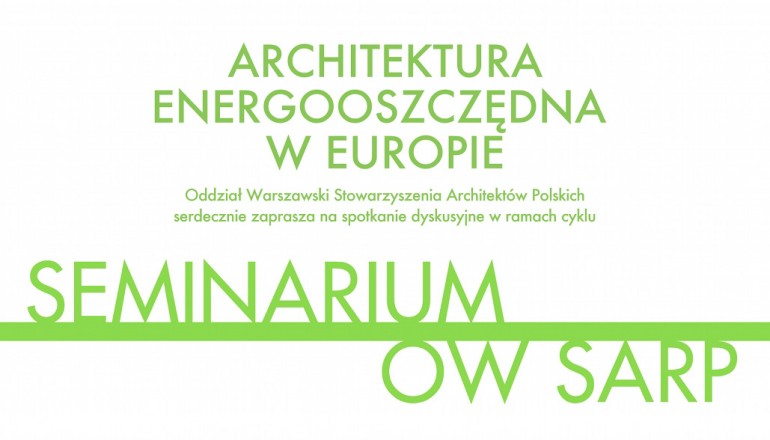Seminarium OW SARP „Architektura Energooszczędna w Europie”

Oddział Warszawski Stowarzyszenia Architektów Polskich serdecznie zaprasza na Seminarium OW SARP „Architektura Energooszczędna w Europie” w ramach Tygodnia z Architekturą 2016.
Naszymi gośćmi będą:
Pan Andrzej Rajkiewicz, wiceprezes Narodowej Agencji Poszanowania Energii, który przedstawi problematykę budownictwa energooszczędnego w świetle obowiązujących dyrektyw unijnych, oraz
Pani Hanna Szemző, dr socjologii z Metropolitan Research Institute w Budapeszcie, która przybliży słuchaczom zjawisko współczesnych energooszczędnych kooperatyw mieszkaniowych w Europie.
Poniżej znajdą Państwo opis wystąpień oraz sylwetki mówców.
Seminarium odbędzie się 6 czerwca, w poniedziałek, o godz. 17:00 w Sali Lustrzanej OW SARP przy ul. Foksal 2 w Warszawie.
Ze względu na ograniczoną liczbę miejsc uprzejmie prosimy o potwierdzenie chęci uczestnictwa: rejestracja@sarp.warszawa.pl.
Jednocześnie informujemy, iż wystąpienie dr Hanny Szemző odbędzie się w języku angielskim i nie będzie tłumaczone.
Hanna Szemző, PhD is a senior researcher at the Metropolitan Research Institute. Her expertise includes welfare and social policy, urban policy and demography. She has participated in various international research projects focusing on urban regeneration, revitalization of large housing estates and pension policy. She has worked as a consultant for municipal urban development strategies. She defended her PhD thesis at the Central European University in 2013 entitled The Hungarian Pension System, 1948-1990: Welfare and Politics in a Socialist Country in its European Context.
Collective Self-Organised housing and its implications for the housing market in the EU
Collective Self-Organised (CSO) Housing represents a new approach to housing construction and (to some extent) to housing management, as it puts a strong emphasis on the collective decision making processes and on the incorporation of sustainable solutions, ranging from energy efficiency to social sustainability. Although the movement behind CSO housing goes a long way back, and substantial institutional support can be found from the 1970s in Scandinavian countries, the topic itself has come to the centre of attention quite recently in the EU countries. In its emergence the real estate crisis of 2008 played a significant role as well as the increasing awareness about the importance of energy efficiency and the importance of green solutions both among the population and the decision makers. Finally, local crises, resulting in the unavailability of appropriate and decently priced housing in many cities, also contributed to municipalities taking action, and embracing the concept of CSO housing.
The presentation will seek to introduce the CSO concept based on the results of the research carried out within the PROFICIENT project, which is an EU funded 7th framework research project (www.proficient-project.eu). It will provide a European overview on the different meanings and applications of the CSO concept in the housing market, demonstrating advantages and problems associated with the practical application. It will also show various organisational concepts and architectural layouts of the CSO buildings. In this context the issue of sustainability will be pivotal: the concept will be presented from various points of view, including energy efficiency, economy and social considerations. Finally, the possible role of different actors will be touched upon in promoting the CSO movement, with a special emphasis on municipalities, who have the capacity to promote CSO housing even without subsidies.
Andrzej Rajkiewicz, wiceprezes Zarządu Narodowej Agencji Poszanowania Energii SA oraz honorowy wiceprezes Zarządu Ogólnokrajowego Stowarzyszenia „Poszanowanie Energii i Środowiska” SAPE-Polska. Ekspert w dziedzinie finansowania przedsięwzięć efektywności energetycznej w budynkach, kieruje zespołami projektowo-badawczymi oraz tworzy plany finansowania takich przedsięwzięć. Opracowuje biznes plany i studia wykonalności dla inwestycji związanych z poszanowaniem energii w budynkach i wykorzystaniem odnawialnych źródeł energii. Prowadzi także badania rynku poszanowania energii.
Budownictwo energooszczędne – dyrektywy unijne a ich realizacja.
Celem projektu UE ZEBRA2020 jest obserwowanie, dzięki stworzonemu systemowi monitorowania, postępów w transformacji rynku budowlanego w Europie w kierunku budownictwa niskoenergetycznego. Pozwala to na opracowanie rekomendacji dla wszystkich uczestników łańcucha powiązań w kręgu sektora budowlanego zarówno w skali Unii Europejskiej jak i w krajach objętych projektem, w tym w Polsce. Bliższe informacje o projekcie znajdują się na stronie: zebra2020.eu

